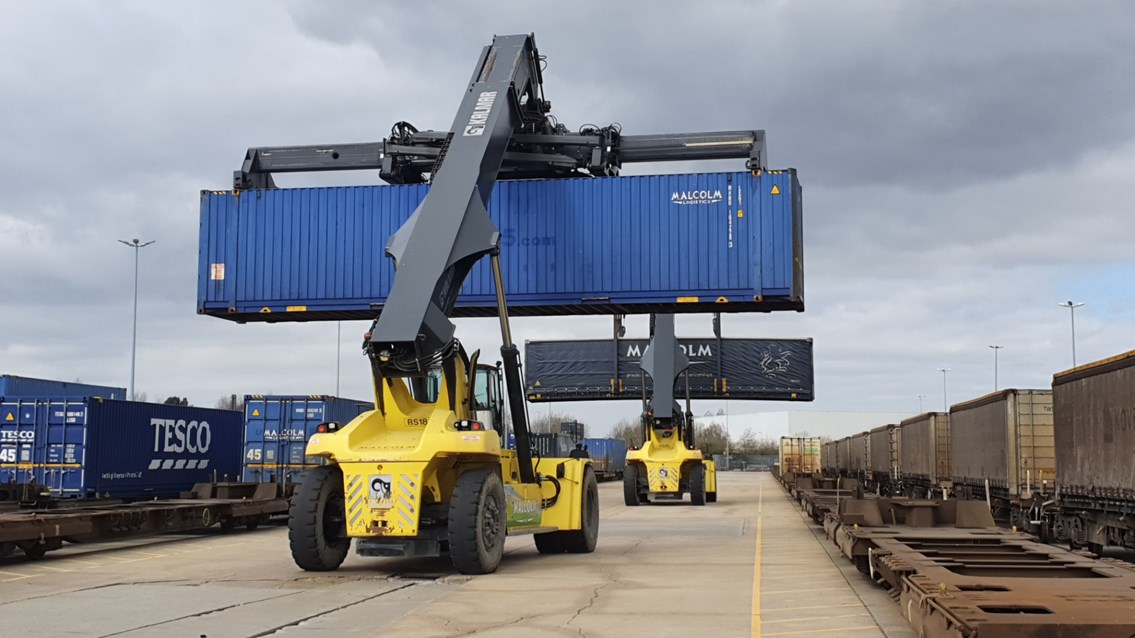Friday 5 Nov 2021
Thousands of tonnes of essentials transported by rail to Scotland daily
- Region & Route:
- North West & Central
If you see COP26 delegates munching a snack while strolling the streets of Glasgow, there’s a fair chance those tasty bites arrived in Scotland by rail.
Every 24 hours, more than 8,000 tonnes of food, products and other essentials pass over the England-Scotland border at Gretna in freight trains - the greenest way of transporting food, drink and other essentials in bulk.
As Scotland does not have any deep-sea container ports, it relies on the West Coast main line to keep supplies moving north.
Next day those goods can be found on sale in supermarkets, high street shops and hospitality venues like Glasgow’s huge COP26 conference complex on the banks of the river Clyde.
The West Coast main line and its key spurs moving more than 1 million tonnes of freight every week.
Every 24 hours, 188,000 tonnes of critical supplies move by rail between London, Birmingham, Manchester, Liverpool and Glasgow.
Each freight train – pulled by one locomotive – takes up to 76 heavy goods vehicles off the road.
With COP26 now well under way, the rail industry’s ‘We Mean Green’ campaign aims to highlight how moving more goods by rail could help combat climate change.
As 200 world leaders seek a solution to rising global temperatures, the importance of freight comes into sharp focus - and nowhere more so than on Network Rail’s North West & Central (NW&C) region, known also as the ‘Backbone of Britain.’
Tim Shoveller, managing director for North West & Central, said: “Ordinarily, rail freight goes largely unnoticed. Much of it travels by night, rolling in darkness to and from every part of the country to keep shops, pharmacies and hospital stocked - but now is the time for us all in the rail industry to promote its green credentials.
“Moving goods by rail is an easy clean and green solution, taking polluting lorries off our congested roads to transport vital supplies around the country in a fast, reliable and environmentally friendly way.”
Meanwhile, as capacity and demand for rail freight grows as the economy bounces back from the coronavirus pandemic, freight companies are looking at how they can reconfigure trains in order to get more containers on them.
Maggie Simpson, director general of Rail Freight Group, said: “Rail freight is helping companies across the country go green, with each train producing 76% less carbon emissions than HGVs on average. Moving more by rail is good for the environment, good for road congestion and good for consumers who want their products delivered on time and in a sustainable way.
“More and more companies are looking to use rail as part of their sustainability plans, and the rail freight operators and Network Rail are working hard to meet this demand, with new services and facilities expecting to be developed in coming months.”
For more information on how Network Rail and freight operators work together visit: https://www.networkrail.co.uk/industry-and-commercial/rail-freight/
To read more about the rail industry’s We Mean Green campaign visit: https://www.networkrail.co.uk/stories/we-mean-green/
Contact information
Passengers / community members
Network Rail national helpline
03457 11 41 41
Latest travel advice
Please visit National Rail Enquiries
Journalists
Network Rail press office - North West & Central Region
0330 854 0100
NWCmediarelations@networkrail.co.uk
About Network Rail
We own, operate and develop Britain's railway infrastructure; that's 20,000 miles of track, 30,000 bridges, tunnels and viaducts and the thousands of signals, level crossings and stations. We run 20 of the UK's largest stations while all the others, over 2,500, are run by the country's train operating companies.
Usually, there are almost five million journeys made in the UK and over 600 freight trains run on the network. People depend on Britain's railway for their daily commute, to visit friends and loved ones and to get them home safe every day. Our role is to deliver a safe and reliable railway, so we carefully manage and deliver thousands of projects every year that form part of the multi-billion pound Railway Upgrade Plan, to grow and expand the nation's railway network to respond to the tremendous growth and demand the railway has experienced - a doubling of passenger journeys over the past 20 years.
Follow us on Twitter: @networkrail
Visit our online newsroom: www.networkrailmediacentre.co.uk

